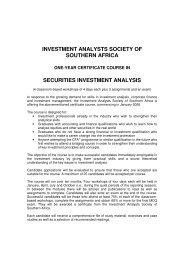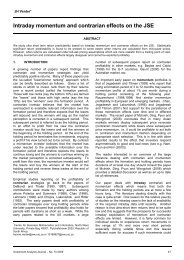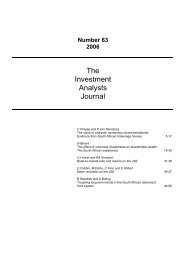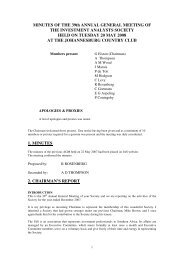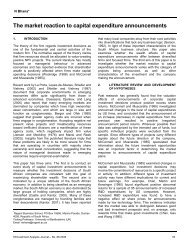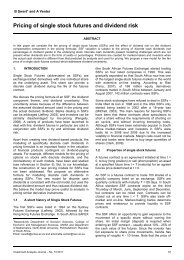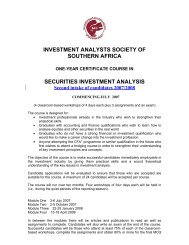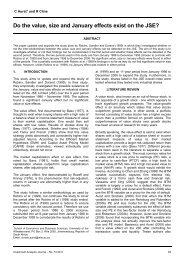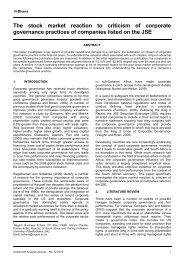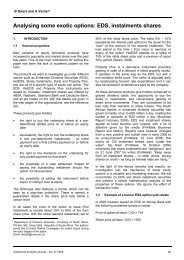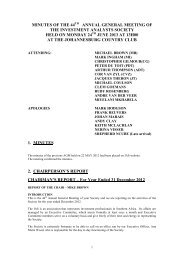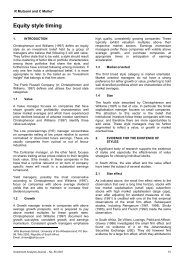Accounting is Broken - Investment Analysts Journal
Accounting is Broken - Investment Analysts Journal
Accounting is Broken - Investment Analysts Journal
Create successful ePaper yourself
Turn your PDF publications into a flip-book with our unique Google optimized e-Paper software.
Stern Stewart & Co.<br />
I ronically some of the sharpest observers of stock market behavior–the so-called “eff i c i e n t ”<br />
market theor<strong>is</strong>ts–do not find favor with th<strong>is</strong> recommendation. They argue persuasively that<br />
astute, price-setting investors look beyond re p o rted earnings and take into account all publicly<br />
available information relevant to the valuation of shares. They think the aim of re f o rm<br />
should simply be fuller information d<strong>is</strong>closure and re g a rd as folly the idea that one tru e<br />
e a rnings measure can be defined. A recent Wall Street Journ a l editorial by regular column<strong>is</strong>t<br />
Holman W. Jenkins, Jr. <strong>is</strong> indicative of th<strong>is</strong> school of thought:<br />
Studies galore show that stock prices already behave as if investors understand what options<br />
cost them in terms of potential dilution of their ownership stakes. The <strong>is</strong>sue has been fully<br />
aired and the proposed rule, if adopted, would have no impact on share prices.<br />
Much Ado About Stock Options–Act Tw o<br />
By Holman W. Jenkins, Jr.<br />
The Wall Street <strong>Journal</strong><br />
August 7, 2002<br />
Although bookkeeping<br />
entries are not real, re a c-<br />
tions to bookkeeping are .<br />
Jenkins and other like-minded souls are correct as far as the professional investor <strong>is</strong> conc<br />
e rned but go awry in suggesting that the auditor’s definition of earnings <strong>is</strong> unimport a n t .<br />
I ro n i c a l l y, the counter argument appeared the same day in a separate Wall Street Journ a l<br />
a rticle (“What the New Option Rules Mean for Your Pay”):<br />
As companies begin expensing options, they are almost certain to get stingier about handing<br />
them out because it will hurt their bottom line. That will have major implications for how a<br />
wide array of employees negotiate their compensation packages.<br />
Although bookkeeping entries are not real, reactions to bookkeeping are. The media, re g-<br />
ulators, unions, employees, and top executives all tend to take re p o rted earnings seriously<br />
at face value. The press judges business leaders by the amount of earnings they book.<br />
Labor unions base wage demands on d<strong>is</strong>closed corporate profits. Accountants are sued<br />
when their profit re p o rts are alleged to be m<strong>is</strong>leading. Most damaging of all, bonuses for<br />
corporate top brass are almost universally tied to book income measures, and that d<strong>is</strong>tort s<br />
almost every dec<strong>is</strong>ion they make, including how they manage r<strong>is</strong>k:<br />
Reported earnings are<br />
indeed of considerable<br />
practical importance,<br />
and a far better definition<br />
<strong>is</strong> needed.<br />
Enron’s r<strong>is</strong>k manual stated the following: “Reported earnings follow the rules and principles<br />
of accounting. The results do not always create measures cons<strong>is</strong>tent with underlying economics.<br />
However, corporate management’s performance <strong>is</strong> generally measured by accounting<br />
income, not underlying economics. R<strong>is</strong>k management strategies are therefore directed at<br />
accounting rather than economic performance.” Th<strong>is</strong> alarming statement <strong>is</strong> representative<br />
of the accounting-driven focus of U.S. managers generally, who are all too frequently have<br />
little interest in maintaining controls to monitor their firm’s economic realities.<br />
Testimony of Frank Part n o y<br />
P rofessor of Law<br />
University of San Diego School of Law<br />
Hearings before US Senate Committee on Government Aff a i r s<br />
J a n u a ry 24 t h , 2002<br />
P rofessor Partnoy has fingered the smoking gun of the accounting scandals. It <strong>is</strong> the rank<br />
f a i l u re of accounting to account for economic value. Reported earnings are indeed of considerable<br />
practical importance, and a far better definition <strong>is</strong> needed.<br />
The proposed re f o rms now making the rounds are way too timid for the task at hand. Ye s ,<br />
employee stock options should be expensed, and pension fund gains should be eliminated<br />
f rom income. But proposals such as those have more to do with appearances—forcing companies<br />
to re p o rt lower earnings—than the real <strong>is</strong>sue of getting out a more accurate and re l-<br />
evant measure of earnings. The pundits are for the most part swatting flies when there are<br />
s a c red cows to kill.<br />
2



